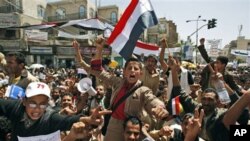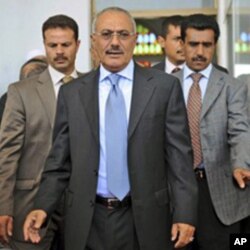For weeks, thousands of protesters have been gathering regularly in a central square in the Yemen's capital, Sana’a, demanding an immediate end to President Ali Abdullah Saleh's 32-year rule. Even though some rallies have turned violent resulting in the loss of human life, Saleh has, so far, only offered not to run for re-election in 2013 and not pass power to his son.
To get an inside view of events in Yemen and to examine them in the context of revolutions in other Arab countries, we contacted Thomas Finn, Features Editor at the English-language Yemen Times, who also files reports for The Guardian. VOA’s Davin Hutchins spoke to him ahead of another planned large anti-government rally in Sana’a, which traditionally take place on Fridays.
Hutchins: In recent weeks, Yemen has witnessed rallies - those which strongly reject the regime of Ali Abdullah Saleh and others strongly supporting the regime. Which protest group do you think better represents the wider sentiment in the country?
Finn: Actually, it is something that is not that easy to gauge. Talking to people in the streets in Sana’a, shopkeepers and taxi drivers, you would reckon that it is somewhere about fifty-fifty. You have lots of people saying that the president is the only person who can hold Yemen together. And you have other people saying that the president is the only thing that is stopping Yemen from developing and growing out of being such a poor country.
But something that you do notice about the pro-government protesters and the anti-government protesters is the age gap. The people who are protesting against the government are generally young and educated, unemployed, some of them English-speaking professionals, whereas the government supporters tend to be in their thirties and forties, and traditionally dressed. They are not wearing jeans. They are wearing traditional Yemeni garb.
Now, three quarters of the population is Yemen is under the age of 25. It has a massively young population. So, if you went by that, you would suggest that the wider sentiment in Yemen is against the president. But it’s by no means as clear as it was in cases like Egypt and Tunisia.
Hutchins: What are the anti-regime protesters specific demands?
Finn: The protesters in Yemen are a mixed bunch. As I said, you have young people, students but, firstly, almost everyone is calling for the president to go. Demands other than that differ a lot. You have young people who want jobs, who want an end to unemployment. And you also have tribesmen who are against the government and who are calling for an end to corruption and an end to bribery.
And the other demand that you often hear on the street is for the president to remove his family from positions of power in Yemen. His sons all hold powerful positions in the military. And aside from the president stepping down, something people would like to see here is him removing them from those positions.
Hutchins: You had an article in your paper recently from the U.S. Ambassador to Yemen, Gerald Feierstein, who says that the opposition movements have not really articulated what kind of rule they would want or how the government would function after Saleh. Do you think that this is a fair characterization?
Finn: Yes, it probably is. As I said, the opposition here is very divided. It’s a mixed bunch. You have an Islamist party called the Islah and some within it are calling for an Islamic caliphate in Yemen. You also have a bunch of time-worn socialists from back-in-the-day, who have a completely different set of demands. But the hardest question you can put to anti-regime protesters at the moment is – give the name of Yemen's next president. It is something that people are very unsure of.
However, young people with whom you would speak at the university, who are protesting, say that once the president is gone, that would clear the path for true democracy in Yemen. And the reason why they really don’t know the name of the next president in Yemen is because they would like for it to be a civilian, somebody who is not a powerful figure in Yemeni politics at the moment…
And, certainly, if [Saleh] continues to stay in power and things continue to escalate the way they are, they could get a lot more anguish and violence as a result of him being in Yemen rather than him not being here, and we could see parts of the country completely breaking from his control if things continue the way they are.
Hutchins: Speaking of that escalation, have you seen from Friday to Friday an increase in tension? And what do you expect to see this coming Friday?
Finn: The pattern so far has been that the protesters gather en masse on Friday. They all go to the mosque at 12 o'clock and pray, and then they all pull out together afterwards and head to the protests. Now, what we have been seeing in Sana’a University is protesters praying en masse together on the grounds. I mean thousands and thousands of people.
And they also, as well as praying, hold memorials and ceremony [in memory] of the protesters that have been killed recently. Last weekend in Yemen we saw seven protesters killed by riot police using tears gas, water cannons and batons. So I expect this rally to be a bigger turnout than last week’s – over 40 of 50,000 people in the capital, I would imagine, and a mass prayer in memory of these martyrs, as they call them.
Hutchins: Do you think Saleh will call a state of emergency if [these rallies] get much larger?
Finn: I think it is unlikely that President Saleh will call a state of emergency unless he really has to. He has been doing his best not to give the media much in terms of reporting on these protests. His strategy at the moment seems to be to prevent foreign journalists from entering the country. He also kicked four foreign journalists out of the country last week. But I don’t think that he is likely to call a state of emergency, unless things really escalate and we start seeing people getting shot in the street and severe violence in the streets.
Hutchins: And if these are Saleh’s final days, do you think he will approach a transition more like Mubarak or more like Gadhafi?
Finn: I spoke to a member of the ruling party who has recently resigned from the party, and he said that while Saleh is aware of the opposition against him, he still does not really believe it. He’s ruled the country for 32 years and he really views himself as a savior of this country. We saw him the other day blaming the unrest in the Middle East on America and Israel to, in a way, scapegoat himself. I would say that President Saleh is more likely to behave like Gadhafi in his final days than Mubarak.





